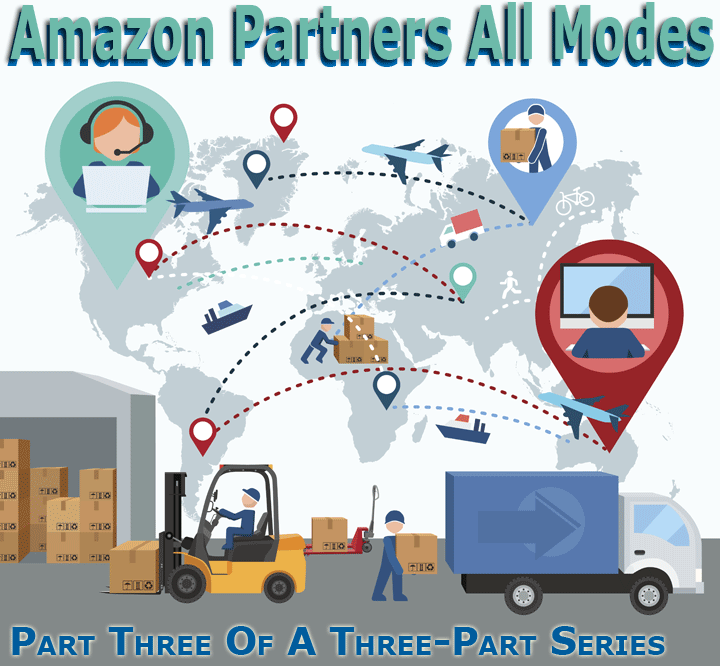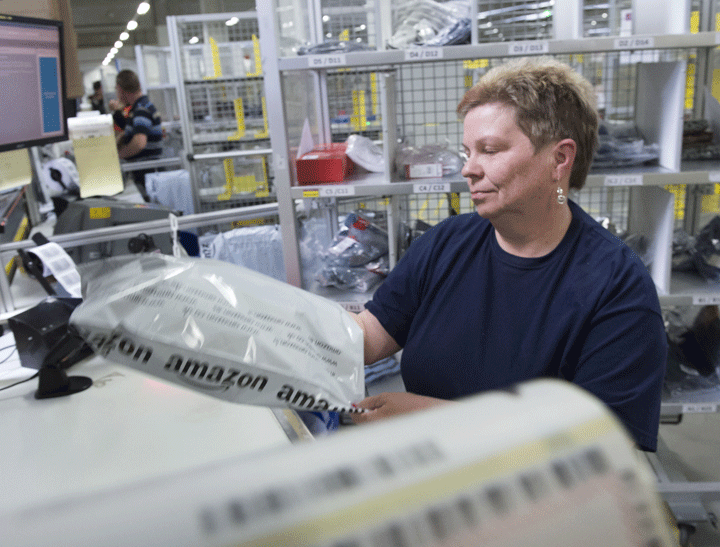
If its recent activities
are anything to go by, Amazon is committed to building
up its global warehousing and delivery business by investing
further in its logistics network, including air freight
capacity. In part 3 of FlyingTypers’ analysis
of what this means for incumbent transport providers,
we spoke to Cathy Roberson, Founder and Head Analyst
for Logistics Trends & Insights.
 FlyingTypers: Amazon’s
move into logistics has thrown many incumbents, including
integrators, off balance—what do you think the
retailers supply chain strategy is? FlyingTypers: Amazon’s
move into logistics has thrown many incumbents, including
integrators, off balance—what do you think the
retailers supply chain strategy is?
Cathy Roberson: Amazon is moving into
airfreight/forwarding to take control of its supply
chain from manufacturers/sellers in China/Vietnam etc.
to Amazon-branded trailers driven by 3rd party truck
carriers to one of its fulfillment centers or sortation
centers, and then ultimately to the consumer’s
front door.
FT: What
does Amazon have to gain?
CR: Amazon
has already moved from being the “Earth’s
Biggest Bookstore” in the 1990s to the “Earth’s
Most Customer-Centric Company,” as it states in
its annual report. By bringing its supply-chain management
in-house, it is following its current strategy to be
the earth’s most customer-centric company. In
addition, its shipping costs continue to climb and trying
to find needed capacity from its two biggest delivery
partners, UPS and FedEx, has proven difficult, particularly
during peak periods. Even FedEx noted this in its last
quarterly update when Patrick Fitzgerald, FedEx Senior
Vice President of Integrated Marketing and Communications,
said: "We work closely with Amazon and have been
aware for some time about their need for supplemental
air capacity related to inventory management.”
FT: Does
this mean Amazon will eventually compete against FedEx
and UPS?
CR: No,
not yet. Amazon needs to get its house in order first.
Their customers come first but I wouldn’t be surprised
if the company eventually sells space on its airplanes/trailers.
I don’t think air freight rates will be impacted
one way or another because of Amazon. It’s the
same with its freight forwarding abilities. What’s
interesting is Amazon’s investment of up to 19.9
percent of ownership of ATSG—how will this affect
ATSG’s relationship with DHL, its largest customer?
FT: What’s
the next step?
CR: I
do expect Amazon to sign a similar air agreement in
Europe, plus they are close to purchasing 100 percent
of Colis Prive in France, pending regulatory approval
that will give them a French ground fleet. They are
already delivering in various German cities much to
the chagrin of DHL, one of their German delivery partners.
Last fall, Amazon acquired a large number of trailers
to be used between fulfillment centers and sortation
centers. Will they buy a trucking company to carry these
trailers? No, I don’t think so, but they could
possibly acquire a broker to help with scheduling and
maintaining trucking relationships.

Susanne Pfaff works
in Amazon’s distribution center in Bad Hersfeld,
Germany. This past April 21 on German Logistics
Day, Amazon allowed shippers and press some insight
into the work environment at the big online retailer. |
FT: Should
integrators be worried?
CR: Definitely
they should be worried; even though many are publically
saying they’re not concerned, privately they are.
Amazon is a large customer of UPS, FedEx, and DHL. They
stand to lose volume as well as revenue if Amazon brings
its entire supply chain in-house. Plus, by combining
delivery with such services as Amazon’s FBA (Fulfillment
by Amazon) and its AWS (Amazon Web Services), Amazon
will attract more retail as well as B2B partners that
may have otherwise used one of the integrators.
FT: Could
other transport buyers take similar steps?
CR: Of
course, but it’s doubtful. From a global perspective,
we’re seeing a fantastic competition between Amazon
and Alibaba—both acknowledging the importance
of logistics for global e-commerce domination. Each
approaches supply chains differently but both are controlling
their supply chain in their own unique way.
FT: Are
there any implications for the shipping and ocean forwarding
industry?
CR: I
seriously doubt Amazon will buy an ocean carrier. I
think that’s one reason why we saw Amazon’s
Chinese subsidiary obtain an ocean freight forwarding
license instead. For the ocean freight market, this
makes more sense. Freight forwarders are already facing
a difficult market thanks to overcapacity, declining
rates, and a global economy that has remained in the
doldrums for several years. However, as Amazon enters
the NVOCC realm, there are bells and whistles going
off in many freight forwarding offices. Amazon could
provide freight forwarding services to Chinese companies
looking to export products directly into its Fulfillment
by Amazon (FBA) warehouses, or perhaps even cross docking
the goods to inject into Amazon’s U.S. delivery
network. In addition, Amazon could provide a service
most other freight forwarders are unable to provide,
limiting the number of cargo ‘handoffs’
within the supply chain as well as fully taking advantage
of its strong IT capabilities to further automate the
process.

A Bronx
Story
Amazon
reportedly has been scrambling after reports began
circulating that the San Francisco-based company
was not delivering its Prime, Free Same-Day Delivery
Service to some zipcodes located in primarily
Black and Hispanic neighborhoods in the Bronx
Borough of New York City.
That
news came on the heels of an earlier report that
Amazon had apparently done the same thing in Roxbury,
a black neighborhood in Boston.
Amazon
said that it is working to expand service to both
locations. |
FT: Will
Amazon face competition from other supply chain disruptors?
CR: Yes.
Alibaba, China’s own monster e-commerce provider,
IT firm, and coordinator of logistics services signed
an agreement with China Shipping Group, its subsidiary,
China Shipping Network Technology, and sister company
China Shipping Container Lines in 2014 to set up an
integrated and cross-border logistics platform. The
platform will allow for both China Shipping’s
and Alibaba’s clients to use it for price inquiry,
ordering, tracking, and settlement.
The race is on between
the world’s two largest e-commerce providers,
and logistics is where the competition will ultimately
determine the winner and perhaps redefine a freight
forwarding market in need of change.
SkyKing
|





